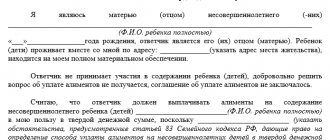Child support payments for minor children are calculated from the salary or other income of the parent living separately. According to current legislation, the calculation of alimony is the right for bailiffs and accountants working in the employing organization. It is the latter who most often ask a reasonable question: Child support is calculated from clean or dirty wages.
Without clarifying the intricacies of withholding funds from wages, accounting employees are not able to make postings.
Basic information
After a divorce, a parent who lives separately from his former family is required to pay child support. If he refuses, the monetary payments due to the minor are collected forcibly through the court.
Alimony is calculated in two ways.
- If the parents have entered into an agreement on a voluntary basis and have it certified by a notary, then in this document they have the right to indicate any conditions for transferring funds to the child regarding the amount of payments, frequency of money transfers and other nuances. But the amount of alimony in the agreement cannot be less than the amount that the court would establish in this case. It is also imperative to include in the text of the document a clause on the indexation of payments.
- If you had to go to court to establish alimony, the money can be accrued in several ways. Thus, if a parent officially earns money, alimony is established as a share of his income: for 1 child - 25%, for two minors - 33%, for three or more children - 50%. If the parent’s earnings are irregular and are transferred in foreign currency, then the court establishes alimony in a fixed amount in accordance with the minimum wage indicators.
Basically, child support is collected as a percentage of the parent’s official salary. But in the case of a gray or black salary, the collector of funds may encounter certain difficulties.
What are clean, dirty, gray and black wages?
The so-called dirty salary is a sum of money transferred to the employee, from which taxes, contributions and other obligatory payments have not yet been withheld. As for the net salary, this is the amount that the employee receives after all necessary deductions.
The size of the net salary is always less than the size of the dirty salary, since the corresponding contributions have not yet been deducted from the latter.
Additionally, concepts such as gray and black wages are highlighted.
Gray salary is a combination of a person’s official and unofficial salaries: that is, he receives a certain part of the money officially, and the rest is not reflected in the reports. The amount of money not indicated in the reports is transferred to the subordinate “in an envelope.”
The employer does not deduct insurance and tax contributions from the black salary. It is issued to a subordinate bypassing tax laws.
From what earnings is alimony collected?
Alimony is withheld from the payer's net salary. Thus, first of all, the accounting department of the enterprise deducts insurance premiums and personal income tax in the amount of 13% from the subordinate’s earnings, and then alimony according to the writ of execution.
Additionally, alimony is also collected from other income of the payer:
- supplements and allowances to the basic salary;
- cash rewards, accrued bonuses;
- compensation (except for compensation for damage caused to human health and life);
- vacation pay;
- sick leave payments;
- severance pay paid to the resigning employee;
- unemployment benefits, disability benefits.
This is not a complete list of payments - alimony is also collected from other possible income. But first, taxes and insurance premiums are withheld from these payments.
How is child support paid?
Alimony is withheld as follows:
- the accounting department of the company where the payer works receives an executive document (for example, an alimony agreement or a court order);
- the payer receives dirty wages;
- taxes and contributions are deducted from dirty wages;
- The amount of alimony is calculated from the net salary;
- the recipient is transferred funds in the established amount.
The writ of execution is sent to the accounting department by the company personally by the recipient of the funds if he and the alimony holder have agreed on the voluntary fulfillment of financial obligations. This document is supplemented by a statement from the claimant with a request to withhold alimony payments in the specified amount.
If the payer evades alimony obligations, then the claimant will need to seek help from the FSSP. In this case, a representative of the FSSP will begin to engage in forced collection of funds. The writ of execution, sent to the accounting department of the payer's company, is supplemented by a resolution on the commencement of enforcement proceedings.
If an employer, without any reason, refuses to transfer funds from the payer’s salary to a claimant or a representative of the FSSP, then he may be held administratively liable.
As soon as the employer has received the writ of execution, he issues an order according to which alimony will be withheld from the subordinate’s salary. The company's accountant is responsible for carrying out calculations, withholding payments and transferring funds to the recoverer.
Every month, the company’s accountant will have to fill out a special payment order, reflecting the following information:
- bank details of the employing organization and recipient of funds;
- transfer size;
- purpose of payment;
- settlement period (current month of alimony collection, year);
- information about the alimony provider: full name, tax identification number;
- details of the writ of execution on the basis of which funds are collected (No., date of execution of the document).
Within 3 days from the moment the subordinate’s salary was accrued, alimony must be transferred according to the details specified in the documents. Banking and postage costs are borne by the support provider (not the company).
If, due to the fault of the accountant, alimony was transferred in the wrong amount or late, then the collector of the funds must file a claim with the court, asking to establish a penalty for late payments. The accountant and the employer can be brought to both administrative and criminal liability - it all depends on the severity of the consequences that resulted from the mistake made by authorized persons.
Alimony is listed as “priority”. Thanks to this, banks transfer these payments as quickly as possible.
Payment procedure
The procedure for calculating alimony from wages is approved at the legislative level. Part 1 of Article 99 of 229-FZ strictly states that all mandatory payments from the income of alimony payers are made only after all taxes have been withheld.
“Dirty” wages do not reflect the real money that the payer may have, and therefore cannot be the basis for calculating alimony.
In the first situation, we will consider how alimony is calculated from wages for “dirty” income; in the second, we will calculate payments from wages or patent income received by the alimony payer in hand.
- The citizen received “dirty” wages in the amount of 15,000 rubles. He has one minor child, to whom he must pay alimony in the amount of 25% of the monthly remuneration received or other income, including patent income. If enforcement payments are calculated from the “dirty” amount of income, then the child will receive 3,750 rubles, personal income tax will be calculated in the amount of 1,463 rubles, and the payer himself will receive 9,787 rubles.
- Let's calculate the amount of alimony not from the “dirty” salary, but from the amount of net income. The accountant initially charges personal income tax on 15,000 rubles, as required by law. The tax will be assessed and paid to the budget in the amount of 1950 rubles. A minor dependent will receive 3,262.50 rubles, and the citizen himself will receive 9,787.50 rubles.
Calculations clearly demonstrate that the amount of money that remains at the disposal of the alimony payer does not change depending on the procedure for calculating alimony from wages. When using a legally approved method, the amount of payments in favor of the child is insignificantly reduced, and personal income tax, on the contrary, increases.
The following payments are deducted from the calculated amount of alimony:
- survivor's pension assigned by the state;
- compensation payments for damages and injuries received while performing main work;
- compensation for damage from man-made disasters;
- compensation for caring for a disabled dependent (parents, spouses);
- listed humanitarian aid;
- income received from business trips;
- depreciation proceeds.
In other cases, alimony from wages is collected in full. Salary or tariff rate, all bonuses and incentive payments, vacation pay, professional bonuses, additional payments for working overtime, at night and on holidays are taken into account when calculating “dirty” wages or remuneration for work before taxes. After all mandatory deductions, alimony is collected from the debtor in accordance with the established procedure.
“Family Code of the Russian Federation” dated December 29, 1995 No. 223-FZ
Order of the Ministry of Labor of Russia No. 703n, Ministry of Finance of Russia No. 112n, Ministry of Education and Science of Russia No. 1294 dated November 29, 2013 “On approval of the clarification on the procedure for applying subparagraph “h” of paragraph 2 of the List of types of wages and other income from which alimony is withheld for minor children, approved Decree of the Government of the Russian Federation of July 18, 1996 N 841"
Federal Law “On Enforcement Proceedings” dated October 2, 2007 No. 229-FZ
Is it possible to collect alimony from a gray or black salary?
The gray salary is transferred to the employee unofficially and does not appear in the reports, so it is impossible to collect alimony from it according to the law. Such salaries are issued for the purpose of evading taxes, insurance premiums, alimony and other payments.
If the alimony provider himself does not transfer funds for the child from the gray salary, then it will not be possible to officially force the accounting department to collect alimony from these payments.
At the same time, the duty of FSSP employees is to search for additional sources of income for the alimony worker, including unofficial ones. Representatives of the FSSP send requests to the traffic police, the Federal Tax Service, the Pension Fund of the Russian Federation, banks, and Rosreestr.
The collector of funds also has the opportunity to influence the unscrupulous alimony provider by independently collecting evidence. He will need to prepare documents that prove the following circumstances:
- the alimony worker often makes expensive purchases and travels abroad, which does not correspond to the size of his official salary;
- a person receives a low salary, although he has a higher education and is a professional in his field (especially if, after a court order to collect alimony payments, the person’s income suddenly decreased);
- The position of alimony worker is high, but the income is too low, resulting in a contradiction.
You can use not only documents, but also the testimony of witnesses (relatives, colleagues, friends, people living in the neighborhood).
In order to prepare evidentiary documents, the claimant has the right to contact the Federal Tax Service and the territorial branch of the state statistics body. Tax service employees will provide the applicant with information about what expenses the person evading alimony spends, what major acquisitions he has made recently.
The territorial branch of the state statistics body will be able to tell the applicant what the salary should be for a person who has the same education, training and qualifications as the alimony worker.
The concepts of “clean” or “dirty” wages
The recipient and the payer need to know from what income alimony funds are collected.
The job situation in our country is difficult. Not every person who has children can find a good job with a decent salary. Many find employment unofficially. They don't pay taxes and their income doesn't go anywhere. But for many women who raise children alone, it is important to know: child support is calculated from what salary?
The answer to this question is also important for payers of funds. The amount of payments and, accordingly, the amount that will remain in the hands of the alimony recipient will ultimately depend on the procedure for making deductions. Well, or, for example, in a bank account.
When a married couple divorces, the issue of further financial support for the child is extremely acute and radical. Before you find out whether alimony payments are calculated from “clean” or “dirty” wages, you need to find out what opportunities a father has to provide financial assistance to his own children.
All provisions regarding alimony payments are listed in Article 104 of the RF IC.
It is important to note that this is a shared accrual, according to which a certain percentage is deducted from the father’s official salary in the form of funds for the maintenance and upbringing of the child, as well as covering all his needs. In most cases, this type of alimony calculation occurs.
There is another available method: a certain fixed amount is established, which the child’s father is obliged to promptly transfer to the baby’s mother every thirty days. The amount of payments is determined by the court. Sometimes the amount is specified in an agreement concluded by two spouses. It must be certified by a notary.
There is another possibility of financial assistance for a child - mixed accrual. According to it, payment of funds to a child occurs in other ways, not always expressed in monetary terms. This is possible when the father does not have a permanent job, or his salary is not enough to cover the baby’s basic expenses.
In most cases, the father begins to pay alimony immediately after all documents for divorce are completed.
In some cases, the day of such payments is considered the date the woman goes to court to resolve disputes regarding alimony.
As a rule, the payers of alimony are men, and women are responsible for raising their common children. Fathers are wondering when they can stop making monthly payments for their child's needs?
Alimony is payments made every thirty days . They must fully provide financial support for the minor child. It is important to note that as soon as the son or daughter of the alimony payer turns eighteen years old, the father has every right to stop providing financial support to his offspring.
If a minor child studies at a higher educational institution, he still loses the right to official support from his father. It can also be a college or school, not necessarily an institute, university or academy.
But that's what the law says. Of course, conscientious fathers still continue to help their own children, despite the fact that the child has become independent. They help, first of all, financially.
This is explained by the fact that while a child is studying at a university, he still needs money for accommodation, food, and purchasing stationery.
In some cases, fathers, realizing that by law they no longer owe their child anything, stop providing their child with stable financial support. There are some nuances here.
For example, if the daughter or son of a person who is obliged to pay alimony is disabled from birth (it does not matter what disease he has), then the father must provide assistance to his child for the period established by the legislation of the Russian Federation.
Is it worth it for the alimony worker to evade payments?
Many alimony workers specifically negotiate with the employer so that he begins to pay them a gray or black salary. In this way, they plan to completely or partially free themselves from alimony obligations, but in the end they risk facing much more serious financial difficulties.
In the case of a gray salary, there is a negative impact on the calculation of a person’s pension in the future, the amount of his sick leave, vacation pay, and unemployment benefits upon dismissal. All these and other payments will be calculated only from the official part of the gray salary. A person will not be able to count on a large loan from a bank, since the income certificate will not contain true information about the applicant’s financial condition.
As for black wages, in this case the rights of subordinates are not protected or regulated in any way. Practice shows that employers often do not transfer salaries to employees for months. Employees are deprived of the right to sick leave, paid and unpaid leave.
For people receiving unpaid wages, their length of service is not taken into account. In the future, minimum pension and social benefits will be established for them.
Such financial difficulties can lead to the fact that a person begins to need financial support from his already grown and able-bodied children. However, those parents who have shirked their obligations towards their children in the past will not be able to count on financial assistance. In addition, for malicious evasion of financial obligations, they risk facing deprivation of parental rights.
Arbitrage practice
An analysis of judicial practice shows that the percentage of successful consideration of claims to increase alimony is 35%. These are average figures for Russia. This practice depends on the fact that the plaintiff is extremely rarely able to prove the presence of “gray” income. The testimony of witnesses - parents of the parties, neighbors, close friends and acquaintances - can help in a positive outcome.
The legislation states that money for the maintenance of a minor child or disabled relatives will be withheld from “white” income. This is done in order to protect the property rights of the payer, who should still have a means of subsistence after paying all monetary obligations.
Additional features and nuances
If the alimony worker understands that he is no longer able to transfer the amount of money monthly in the same amount (for example, he has been diagnosed with a serious illness requiring expensive treatment, or new dependents have appeared in need of support), then he needs to file a claim in court. The statement of claim must indicate all relevant factors and circumstances.
If the court finds that the financial situation of the alimony provider really does not allow him to continue to provide for the child on the same terms, then he will meet the plaintiff halfway and either reduce the amount of payments or completely cancel these financial obligations.
At your own discretion, you should not refuse to transfer alimony, as this will ultimately only lead to the formation of alimony debt, the collection of penalties, penalties and fines. Also, the debtor may face administrative or criminal liability in the form of forced labor, confiscation of a driver’s license, a ban on traveling abroad and other unpleasant consequences.
The procedure for calculating and collecting alimony obligations
Article 81 of the RF IC establishes the amount of payments depending on the level of income of the child support recipient and the number of dependent children. Deductions as a percentage of income are assigned if:
- the alimony payer has a stable level of income;
- father is officially employed;
- the amount of interest collected from the salary is sufficient to meet the basic needs of the child.
Thus, according to the legislation, the amount of financial assistance will be:
- 25% of the salary if the alimony payer has one child;
- 33% of total income if the payer has two dependent minors;
- 50% of the salary if the court ordered the payment of alimony for three or more children.
Collection of funds in the form of a fixed amount
The Family Code of the Russian Federation allows for the possibility of collecting fixed alimony. As a rule, this type of payment is prescribed in the following cases:
- the income of the alimony payer is too low to use the shared form of calculating obligations;
- the person obligated for alimony is not officially employed;
- the father receives profits in foreign currency;
- the payer has income from business activities;
- the dependent is a disabled adult child;
- The alimony recipient is a pregnant spouse or mother raising a common child under the age of three.
Let's sum it up
Thus, alimony is collected from the official salary (or part of it) of the alimony provider after all tax and insurance contributions have been withheld from the accrued amount. The maximum period for transferring funds is 3 working days from the date of accrual of the subordinate’s salary.
Also, alimony can be collected from other income of the payer - for example, from his bonuses, material remuneration, benefits and compensation.
If a person receives a salary “in an envelope,” then it will not be possible to collect alimony from this amount. At the same time, the alimony provider risks facing much more serious troubles in the long term.










